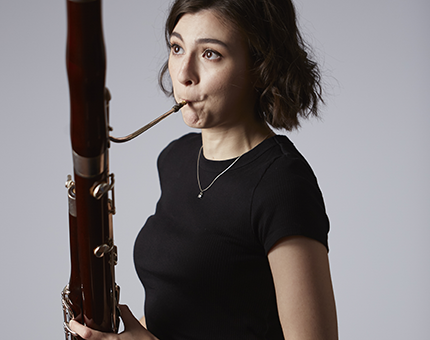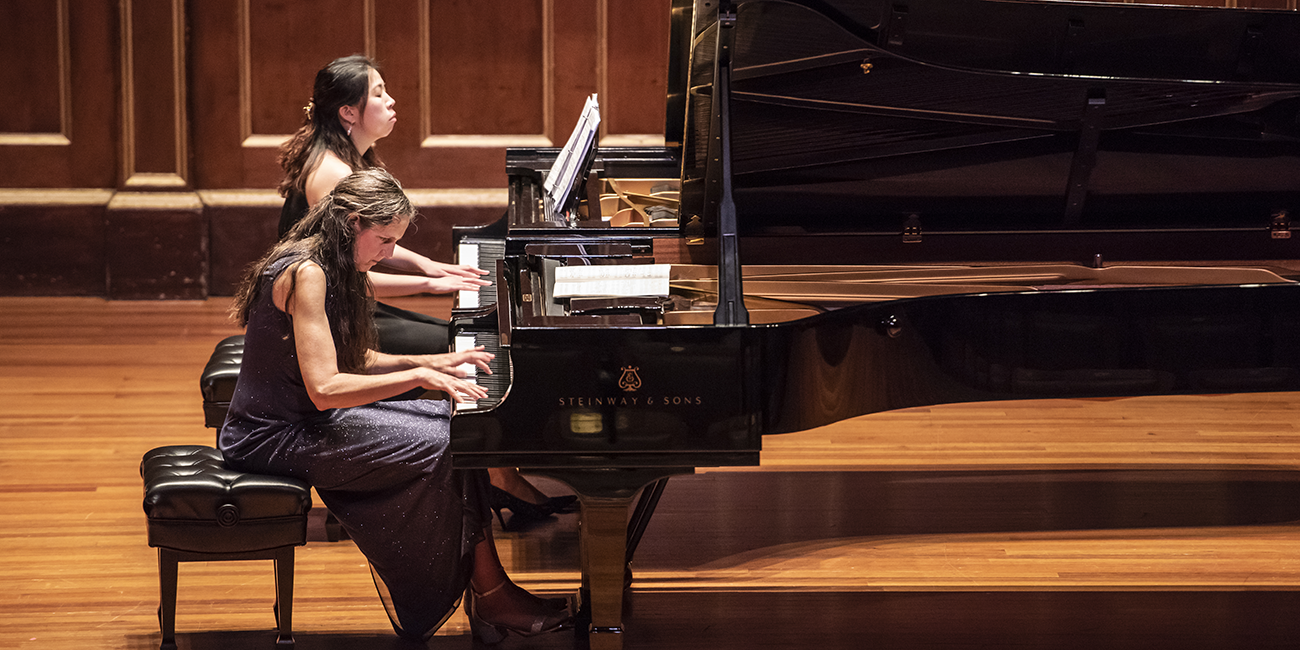Charitable Remainder Trust
A charitable remainder unitrust can help you maintain or increase your income while making a significant gift to New England Conservatory.
If your unitrust grows, your payments will grow too, providing a hedge against inflation. A unitrust provides more flexibility than other life income plans.
A charitable remainder unitrust could be right for you if:
- You want to provide income for yourself or others.
- You want the possibility of income growth.
- You want to save income taxes or capital gains taxes.
- You want to choose the person who administers your gift and guides its investments.
- You want to make a generous gift to NEC.
- You are considering a gift amount of $100,000 or more.
How Your Gift Helps
Your gifts to the New England Conservatory help us educate and train musicians of all ages from around the world, drawing on the talent and deep reservoir of experience of our distinguished faculty. Your support will provide the University with the resources to…
 |  |  |
| inculcate the highest standards of excellence while nurturing artistic sensibility and creative growth; | foster an environment that maximizes individual attention from teachers, allowing students to explore and develop their unique artistic personalities; | reinforce and expand the position of music in society by educating the next generation of musical performers and leaders. |
Separate trust
A charitable remainder unitrust is a tax-exempt trust governed by a trust agreement. You choose the trustee who is responsible for administering the unitrust and guiding the investment of its assets.
Irrevocable gift
A charitable remainder unitrust is an irrevocable arrangement. Once you transfer assets to the trust, you cannot change your mind and get the assets back. This requirement assures that whatever value remains in your unitrust when it ends will go to support NEC.
Payments vary with value of unitrust
Each year, your unitrust will distribute a fixed percentage of its current value, as revalued annually. If your unitrust's value goes up from one year to the next, its payments will increase proportionally. Likewise, if your unitrust's value goes down, its payments will also go down.
Remaining assets to New England Conservatory
When your unitrust ends, all of its remaining principal will become available to support NEC.
You choose the payment percentage
You choose the percentage of your unitrust’s value that it must pay each year to its income beneficiaries. The payment percentage must be at least 5%. It may be to your advantage to choose a relatively low payment percentage so that your unitrust’s assets have the best chance to grow. If the value of your unitrust grows, so will its payments. A payment rate of 5% to 6% is typical. Payments are usually made in annual, semiannual, or quarterly installments.
Payment flexibility
You can include special payment provisions in your unitrust that make it a good way to give debt-free real estate or other illiquid assets that may take time to sell. In this situation, you can limit your unitrust's payments to its net income or its unitrust percentage, whichever is less. This way, your trustee can take the time necessary to sell your assets at a fair price. If your unitrust's net income is less than its unitrust percentage during this time, then it will distribute its net income only. This "net income" limitation can last for the entire term of your unitrust or just until a specific event occurs, such as the sale of your gift asset.
Who can receive payments?
You decide who will get the payments from your unitrust. Usually, this will be you, or you and your spouse. You can, however, select other people to receive the payments. For example, you may wish to provide income for parents, a sibling, or children.
How long do payments last?
While most unitrusts last for one or two lives, other terms are possible. A unitrust can last for more than two lives, for a specific length of time of up to 20 years, or for a combination of lives and years.
Tax benefits
- Earn an immediate income tax charitable deduction.
- Avoid capital gains tax.
- May reduce estate taxes and probate costs.
You will receive an income tax charitable deduction in the year of your gift. If you cannot use the entire deduction in the year of the gift, you may carry forward your unused deduction for up to five additional years. If you give appreciated securities to fund your unitrust, you will not pay any capital gains tax when you make your gift.
In addition, because a unitrust is a tax-exempt trust, it will not pay any capital gains tax when it sells these assets. This means that your trustee will be able to reinvest the full value of the assets you donate. By removing the gift assets from your estate, you may also reduce estate taxes if your estate exceeds the then applicable estate tax credit. You may also reduce probate costs when your estate is settled. The amount of these savings will depend on the size of your estate and on estate tax law in force at the time your estate is settled.
Taxation of payments
The taxation of unitrust payments depends on the trust’s past distributions and investment performance. Payments from a unitrust are typically taxed as ordinary income. If the trust is funded with appreciated assets, a portion of the payments could be taxed at lower capital gains tax rates in some years. It is even possible for a portion of the payments to be tax-free in years when there is not enough ordinary income and capital gain income to make the payments.
Add funds anytime
You can make additional gifts to your unitrust anytime. Additions earn an additional income tax charitable deduction that may save you income taxes if you itemize your deductions. You will also increase future payments without the effort and expense of creating a new unitrust.
Assets to consider giving
The following assets make excellent sources for funding your charitable remainder unitrust:
- Cash that you currently have in a savings account, bank CD, money-market fund, or other safe but low-yielding investment.
- Securities, especially highly-appreciated securities.
It is also possible to create a unitrust using real estate that is debt-free or other illiquid assets that may take time to sell.
Example
Natalie Ryan is 76 years old and her husband John is 75. Many of the stocks in their portfolio have appreciated substantially in value over the many years the Ryans have owned them. They are enthusiastic about making a major gift to support New England Conservatory, but they also would welcome a way to receive greater income from their investments without paying a big capital gains tax.
After consulting with their advisor, the Ryans find that a 5% charitable remainder unitrust funded with $500,000 in assets will meet their needs perfectly. They fund their unitrust with $400,000 in stocks plus $100,000 from a money market fund. They paid a total of $75,000 for the stocks, which currently produce about 2% in dividends each year. Their money market fund has been earning about 2% interest annually.
Benefits
- The Ryans will receive $25,000 in payments in the first year of their unitrust, significantly increasing the income they had been receiving from these assets. If the income and appreciation of the trust's investments, net of costs and fees, total 7% annually, their payments will grow to over $33,647/year* in 16 years.
- The Ryans will receive an immediate income tax charitable deduction of about $240,355**.
- The Ryans' trustee will be able to sell their stock immediately in order to diversify their unitrust's investments without paying any capital gains tax.
- Assuming its investments earn a 7% net annual return on the unitrust's investments, over $686,393* will be left in the Ryans' unitrust to support New England Conservatory when their unitrust terminates.
*The future payment amounts and principal amount remaining for New England Conservatory will be lower if the Ryans' unitrust earns less than 7% annually.
**The Ryans' income tax charitable deduction will vary slightly depending on the timing of their gift.
Additional Giving Options
By making a planned gift, you can strengthen NEC and gain financial and tax benefits for you and your family. For more information, please contact Aaron McGarry, Planned Giving Officer, by email or by phone at 617-585-1356.
Real estate can be contributed as an outright gift or to finance a planned gift. Available options include a retained life estate, which allows the donor to continue to use the property for a certain number of years, or for the donor’s lifetime. Other arrangements offer special tax advantages and lifetime income.
Gifts of real estate include undeveloped land, a residence, a vacation home, a farm, or commercial property. NEC requires the donor to bear certain costs when making a real estate gift, such as an appraisal to determine the fair market value. Also, NEC deducts transaction costs from the proceeds of the sale of the property, including the closing costs, title insurance, a survey (if needed), and any taxes due before the gift is completed.
For any questions about gifts of real estate, please contact Abigail Smitka, Assistant Vice President of Major Gifts and Campaigns, at as3628@necmusic.edu or (617) 585-1719.
Many companies support the philanthropic interests of their employees by matching employee contributions to nonprofit organizations like NEC. If your employer offers a matching gift program, you may be able to double or even triple your gift!
For more information on matching gift contributions, please contact Cheryl Fries, Assistant Director of Advancement Operations, at cheryl.fries@necmusic.edu or (617) 585-1373.
Gifts of personal property, such as musical instruments, recordings, and scores provide valuable support for our music education programs. Through the support of in-kind gifts, you can help NEC meet the college’s ongoing need to expand its inventory — and you qualify for a tax deduction.
NEC accepts in-kind donations on a case-by-case basis. For more information, please contact Patricia Kopko, Director of Advancement Operations, by email or phone at 617-585-1225
Friends of NEC may elect to make gifts to commemorate a loved one’s life, birthday, anniversary, or other special occasion. We will gladly notify those you wish to know of any gifts made in their honor.
Contributions in any amount may be directed to The NEC Fund, or to the area of your choice. Please note the name of the person you wish to commemorate when you make your gift.
Contact Us
To learn more about how you can support NEC, please contact Cheryl Fries, Assistant Director of Advancement Operations, at cheryl.fries@necmusic.edu or (617) 585-1373.
New England Conservatory is a 501(c)3 non-profit organization. All donations are tax deductible to the full extent of the law. Our non-profit tax ID is 23-7225104.
Contact Us






